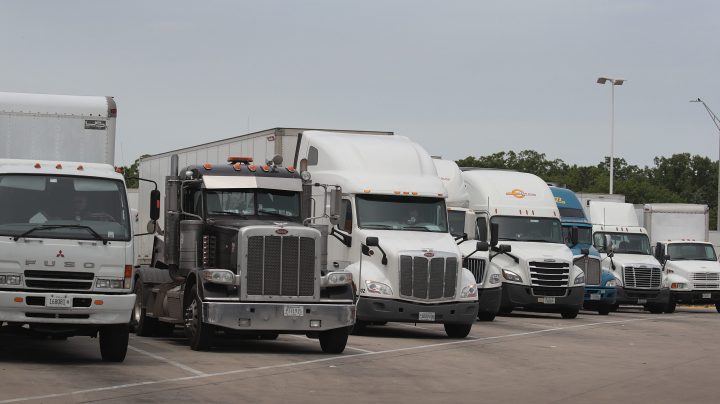
There’s more free capacity on trucks. That means supply chains may be loosening.
There’s more free capacity on trucks. That means supply chains may be loosening.

Recently, it’s been looking like congested supply chains have been easing a bit. There’s a big decline in the number of ships waiting to get into the ports of Long Beach and Los Angeles, and according to freight analysts at Cass Information Systems, freight volumes eased a bit in March, which has freed up capacity for the trucks that haul goods around the country.
Ever since China started locking down ports and manufacturing hubs last month, the country hasn’t been shipping as many products to the U.S.
“That has drastically impacted the trucking capacity needs on the West Coast of the United States,” said Weston LaBar, head of strategy at the freight broker Cargomatic. “Because you’re not constantly getting the flow of goods the way you were.”
There are also more trucking companies than there were a year and a half ago, according to Jason Miller, a professor of supply chain management at Michigan State University.
“We’ve had supply essentially starting to catch back up to where we need it to be,” Miller said.
But it depends on what type of trucking we’re talking about.
Miller said capacity is mostly freeing up when it comes to plain-old unrefrigerated trucks that carry things like clothing, furniture and appliances.
But for flatbed trucks that haul big items, like steel coils and heavy equipment, not so much.
“Right now, we’re seeing flatbed demand is very strong due to demand for machinery, demand for construction,” Miller said.
Even where capacity is freeing up, trucking prices are still pretty high.
“I’m probably paying double a pallet versus a year and a half ago,” said Pat Whelan, who handles imports for Sahadi’s, a grocery store and wholesaler in Brooklyn. While he’s paying more, he said he doesn’t feel as much friction in the supply chain.
“I’m not saying it’s phenomenal,” he said. “I’m not saying it’s anywhere near where it used to be. You’re still having a lot of challenges. But it’s not the challenges you had, say, fourth quarter.”
Even though things are improving, Whelan said he’s still keeping a lot of extra product on hand, just in case.
There’s a lot happening in the world. Through it all, Marketplace is here for you.
You rely on Marketplace to break down the world’s events and tell you how it affects you in a fact-based, approachable way. We rely on your financial support to keep making that possible.
Your donation today powers the independent journalism that you rely on. For just $5/month, you can help sustain Marketplace so we can keep reporting on the things that matter to you.

















